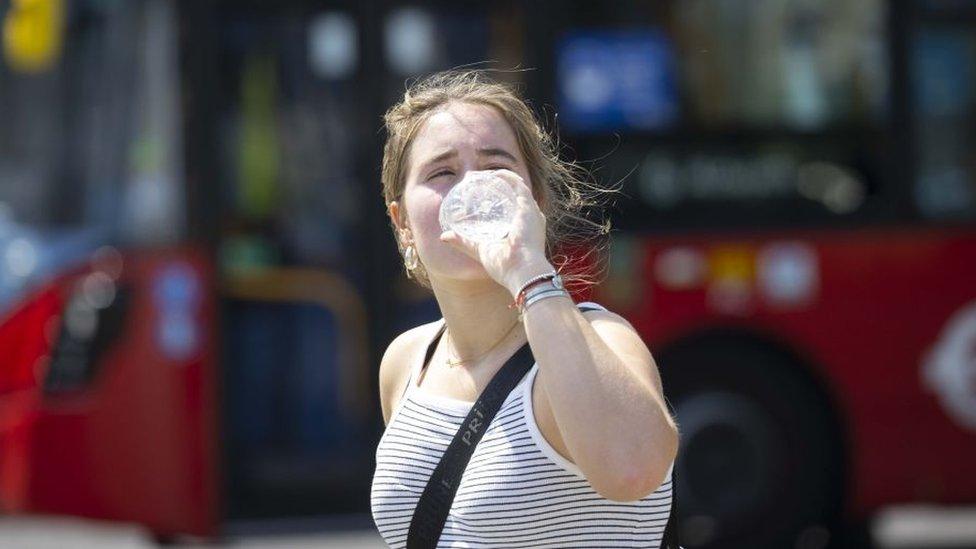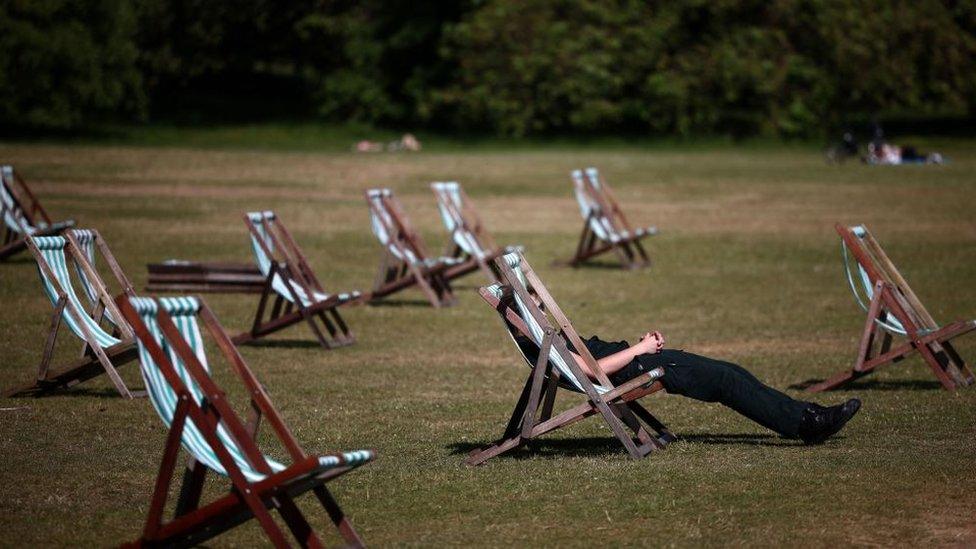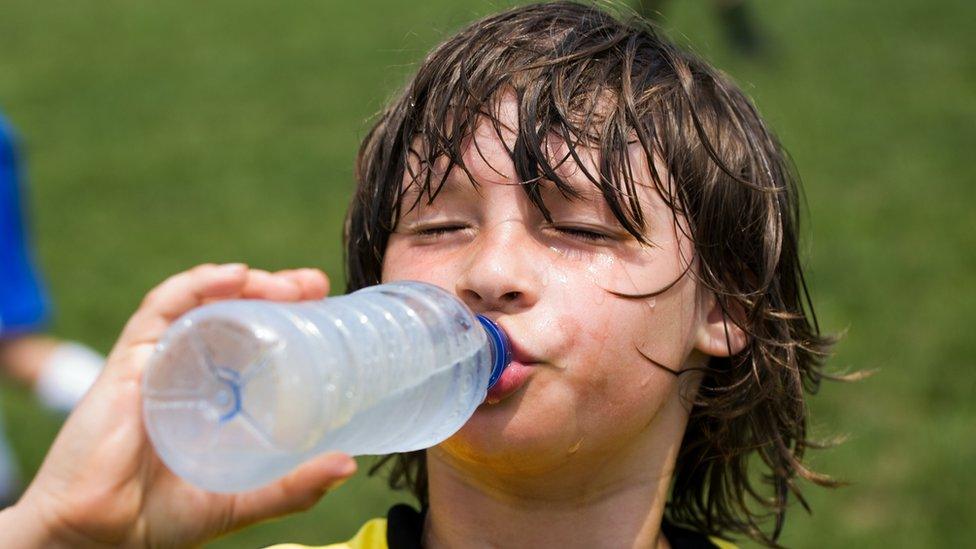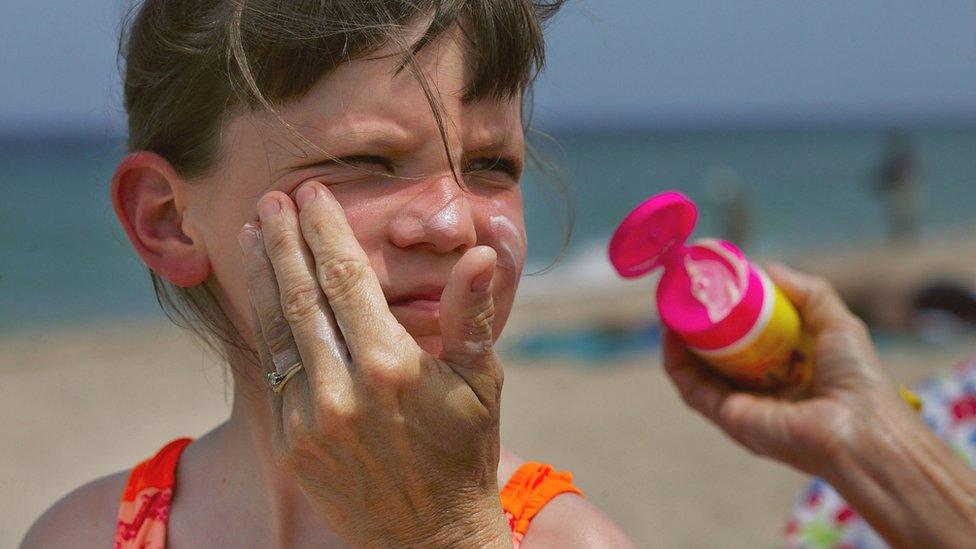Heat health alert in force as parts of UK to hit 30C
- Published

An amber heat health alert has come into force as some parts of the UK are forecast to hit 30C in the coming days.
The amber warning, which indicates high temperatures could affect all ages and impact the health service, is in place across eastern and southern England, as well as in the Midlands.
It will be 5C to 10C above normal June weather this weekend, say forecasters.
The alert, issued by the UK Health Security Agency (UKHSA), was escalated from yellow to amber on Thursday.
Fire services have issued warnings about wildfires and urged people to be "vigilant" this weekend.
Thursday was the hottest day of the year so far, according to the Met Office.
Parts of south-east and north-east England, as well as the Midlands, are due to experience temperatures of 28C to 30C on Saturday, say BBC forecasters.
"Most areas will also notice an increase in how humid it is too, which will lead to some warm nights," said BBC meteorologist Matt Taylor, adding that there was a chance of "some sporadic torrential thunderstorms".
He said with "very dry ground" there was a risk of localised flooding where torrential downpours occur.
The temperatures this weekend will be a "big leap" for some eastern areas of the country where it has been cooler recently, added Mr Taylor.
He also noted that air quality would deteriorate over the weekend due to south-east winds coming off the continent.
The amber alert continues until 09:00 BST on Monday.
A less severe yellow alert, which advises people to check on vulnerable family and friends, is in place for the north of England and London.
A Met Office yellow warning for thunderstorms is also in place for all of Wales and large parts of southern England from 14:00 BST until 21:00 on Saturday. On Sunday, this warning is in place for most of the UK, including Northern Ireland, from 12:00 until 21:00.
This could mean disruption to travel, power cuts and some localised flooding from the heaviest showers.
During the period of hot weather, the UKHSA advises people to:
Check on family, friends and neighbours
Know the symptoms of heat exhaustion and heatstroke, external
Stay out of the sun between 11:00 and 15:00
Exercise or walk your dog at cooler times of the day, such as in the morning or evening
Close windows and curtains in rooms which face the sun
Wear suitable clothing if going outside, including a hat and sunglasses, and apply sunscreen
Drink plenty of fluids and limit alcohol intake
The UKHSA said it was difficult to predict the exact impact of the higher temperatures on the health service, but that there would be additional need from vulnerable groups who suffer in the heat.
This includes people over 65, those with respiratory or cardiovascular conditions and children.

How are the high temperatures affecting you? You can share your experiences via:
WhatsApp: +44 7756 165803, external
Tweet: @BBC_HaveYourSay, external
Please read our terms & conditions and privacy policy

Andy Cole, assistant chief fire officer from Dorset and Wiltshire Fire Service, urged people to be "vigilant" this weekend and avoid using disposable barbecues or starting campfires.
There was a "record number" of wildfires last year, he said, adding that Dorset and Wiltshire saw a "roughly 400% increase" compared to the year before, with 911 recorded.
Speaking to BBC Radio 4's Today programme, Mr Cole said wildfires were "extremely dangerous" and could take a lot of resources from the fire service.
In the Peak District, the discovery of a large fire bowl - used for outdoor cooking - prompted park rangers to warn that fire pits, barbecues, and other heat sources pose a serious risk of causing a wildfire.
Last year fire services in England dealt with almost 25,000 wildfires during the summer, a four-fold increase on the same period in 2021.
Fire crews across the UK are being trained in new Mediterranean-style techniques, from southern Europe and the US, to tackle wildfires.
Climate change is making heatwaves in the UK more likely and more extreme.
Last year was the UK's warmest ever - Coningsby, in Lincolnshire, reached a record 40.3C on 19 July.
The UKHSA expects heatwaves are "likely to occur more often, be more intense and last longer in the years and decades ahead".
The new colour-coded alert system, launched last week, is run by the UKHSA and the Met Office and is aimed at reducing illness and deaths among the most vulnerable.
There is one further alert, not yet issued, representing the most serious risk. The red alert means there is a significant risk to life even for healthy people and a severe impact is likely across all sectors.
Individuals can sign up to receive alerts directly here, external, and people can specify which region they would like to receive alerts for.




